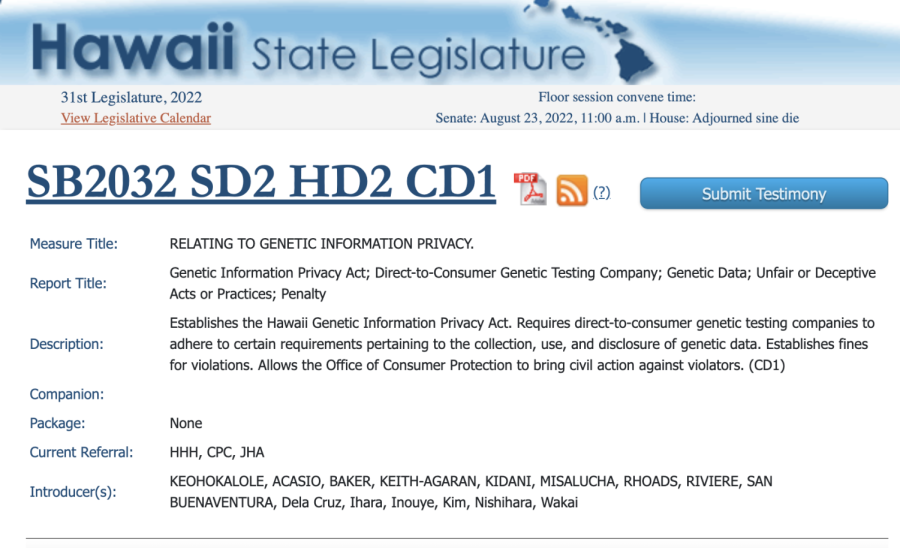Hawaii’s Genetic Privacy Bill Vetoed
By Screenshot capitol.hawaii.gov/
For now, Hawaii consumers who believe their genetic data has been resold without their permission can bring lawsuits under Hawaii Revised Statute 480-2, which declares unfair and deceptive trade practices illegal.
August 23, 2022
On July 12, 2022, Governor David Ige vetoed Hawaii’s genetic privacy bill, SB2032. The bill would have addressed many of the concerns privacy advocates have voiced regarding the operations of Direct to Consumer (DTC) genetic testing companies, such as the resale of consumers’ genetic data to large biotech companies. The bill’s primary sponsor in the Hawaii State Senate supported the veto, indicating he now believes the legislation to be unnecessary.
One of the primary goals of the genetic privacy bill was to force DTC genetic testing companies to provide consumers with more clearly written policies related to obtaining consent for the collection, use, or disclosure of their genetic data. It also prohibited the release of genetic data to law enforcement except under limited circumstances. The bill established penalties for violations and charged the Office of Consumer Protection (OCP) with bringing civil actions through the Office of the Attorney General.
On June 27, 2022, a press release for Governor Ige announced his intent to veto SB2032. The Governor’s rationale for vetoing the bill indicated problems with the included enforcement mechanism. Because SB2032 required the OCP to initiate actions through the Attorney General, OCP’s primary purpose of enforcing consumer rights under existing law would be undermined. Additionally, the rationale said it was unclear whether consumers’ previously established right to file a claim for unfair and deceptive trade practices with OCP would be jeopardized.
During an August 14, 2022 phone interview, I asked the primary sponsor of Hawaii’s genetic privacy bill, State Senator Jarrett Keohokalole, whether he agreed with the Governor’s stated reasons for vetoing the bill. Senator Keohokalole said he did.
Keohokalole explained that his reason for supporting the veto was that “Hawaii’s consumer protection laws are stronger than other states where legislation like this has passed.”
The Senator said that when he wrote the legislation, he followed a model provided by genetic privacy advocates in other states. He now believes this legislation might interfere with individual consumers’ right to file claims under existing Hawaii law (as stated in the Governor’s veto rationale).
Keohokalole acknowledged that current Hawaii consumer protection laws do not specifically address genetic privacy. “This area is fluid, and things might change in the future,” Keohokalole said.
For now, Hawaii consumers who believe their genetic data has been resold without their permission can bring lawsuits under Hawaii Revised Statute 480-2, which declares unfair and deceptive trade practices illegal.







